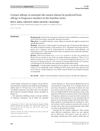Ylang-Ylang
Research
20 / 1000+ results
research Dermatological Drugs and Topical Agents
Certain skin drugs and topical agents, including some natural extracts and fragrances, can cause allergic reactions. Some hair dyes and extensions, as well as minoxidil, a hair growth treatment, can also cause allergies. Botulinum toxin A can effectively reduce sweat but may have temporary side effects.
research A Study on the Trends of Aroma Oils Used in Hair Loss Management
Different aroma oils are suited for dry, oily, or sensitive scalps based on their specific chemical compositions.

research Irritation Test and Hair Growth Activity of Usada Bali Plant-Based Hair Tonic on Mice
The hair tonic from Usada Bali plants increased hair growth without irritating the skin.

research Novel Micelle Formulations to Increase Cutaneous Bioavailability of Azole Antifungals
New micelle solutions greatly improve skin delivery of certain antifungal drugs.

research Contact Allergy to Essential Oils Cannot Always Be Predicted from Allergy to Fragrance Markers in the Baseline Series
Allergies to some essential oils may not be found with standard fragrance tests.

research The New Paradigm for Androgenetic Alopecia and Plant-Based Folk Remedies: 5α-Reductase Inhibition, Reversal of Secondary Microinflammation, and Improving Insulin Resistance
Plant-based remedies may treat hair loss by reducing inflammation and improving insulin resistance.

research Aromatherapy: An Art of Healing
Aromatherapy uses essential oils to improve mood and well-being.

research The Use of Plants in Hair and Scalp Preparations
Plant-based ingredients in hair care are being replaced by synthetic alternatives.

research A Practitioner's Guide to Hair Loss: Part 2—Diet, Supplements, Vitamins, Minerals, Aromatherapy, and Psychosocial Aspects
Non-drug methods like diet, supplements, and aromatherapy can help manage hair loss and its emotional impact.

research Botanical Drug Preparations for Alleviating Hair Loss in Menopausal Women: A Global Ethnopharmacological Mini-Review
Botanical treatments like saw palmetto, rosemary oil, and ginseng may help reduce hair loss in menopausal women.

research Essential Oils for Hair Health: A Critical Mini-Review of the Current Evidence and Future Directions
Essential oils may help hair health but lack strong scientific proof and can cause allergic reactions.

research An Integrative Review on the Treatment of Alopecia with Medicinal Plants, Phytotherapeutics, and Dietary Supplements
Mais estudos são necessários para garantir a eficácia e qualidade dos tratamentos de alopecia com plantas medicinais.

research An Overview of Herbal Ingredients with Anti-Dandruff Activity in Shampoo Formulations
Some herbal ingredients like linalool and tea tree oil have anti-dandruff properties and are safe for use in shampoos.

research Determination of Effectiveness of Traditional Cosmetics of Coconut Oil and Turmeric as Anti-Dandruff
Coconut oil and turmeric were almost as good as 2% ketoconazole shampoo for treating dandruff.

research Allergens and Irritants: Comprehensive Overview of Contact and Occupational Dermatitis
Many substances, including chemicals and metals, can cause skin reactions; careful handling and identification of allergens are crucial to prevent dermatitis.

research Comparison of Formulation and Allergenic Potential of Clean and Traditional Shampoos
"Clean" shampoos use fewer allergenic preservatives than traditional ones but still contain fragrances, and their actual risk of causing skin reactions is unclear.
research Essential Oils and Their Individual Components in Cosmetic Products
Essential oils in cosmetics offer benefits but require careful formulation for safety and effectiveness.
research Application of Niosomes in Cosmetics: A Systematic Review
Niosomes improve the effectiveness of skin and hair cosmetics.
research Systematic Evaluation of Rosemary Essential Oil in Aromatherapy Practice: A Review
Rosemary essential oil can improve mood, sleep, and cognitive function but may cause allergies, so use it carefully.

research Plant Cell Culture as Emerging Technology for Production of Active Cosmetic Ingredients
Plant cell culture is a promising method for creating sustainable and high-quality cosmetic ingredients.

